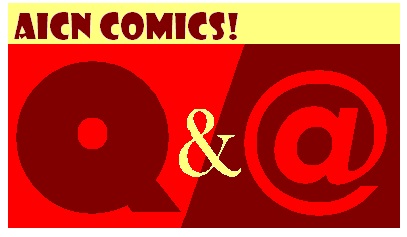
@’s by SPANDEX’s Martin Eden!!!
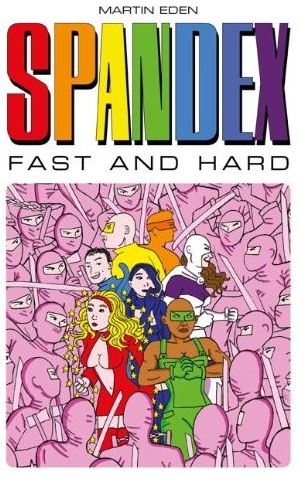 superhero: You’re in the UK, correct?
superhero: You’re in the UK, correct?MARTIN EDEN (ME): Yeah, I live in London. I was born in Birmingham, which is right in the center of England and I moved to London about sixteen years ago to get a job.
superhero: Gotcha. I don’t know what the comics market is like in London. Consider me the ignorant American. How did you get into comics? What were some of your favorites growing up?
ME: I don’t think it’s that much different than America to be honest. I mean over here, I started off on…we had a lot of humorous comics. Have you ever heard of The Beano?
superhero: No. What is that?
MA: Yeah, Beano’s huge. It’s for kids, really. There’s a massive difference in a way. Because over here we have comics that are for kids like The Beano and The Dandy which are still going strong now. But back in the day, like back in the ‘50’s, ‘60’s or ‘70’s, they were selling millions. So you sort of start off on those as a kid and then when you get to about the age of 8 or 9 as a UK child you kind of either stay with comics and explore them more or you drop them altogether and you start playing football or something. So I was one of those people that carried on reading comics. And you kind of evolve and you get more fascinated. Back when I was about 11 or 12 they had comics, all the American comics, Marvel and DC, in corner shops, in news agents. They don’t have them anymore. They don’t have the American comics there anymore, which is such a shame. So that’s how I discovered Marvel. I was a huge Marvel Zombie. I wasn’t too keen on DC 'cause they had really funny names like Plastic Man and Elongated Man. I didn't like those names. I liked Marvel people more. I think I liked Marvel because they're more human and DC are more kind of gods.
superhero: Do you remember what your first comic was? What's the first one that made a huge impression on you, specifically?
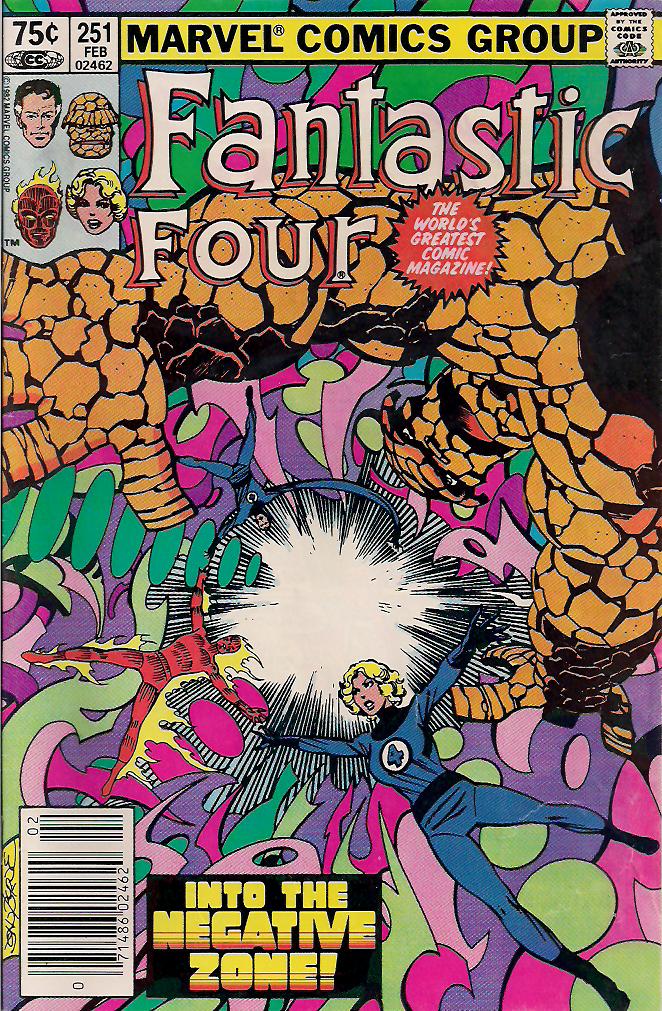 ME: Well, it's funny because I kind of do. I picked up, it was Peter Parker, Spectacular Spider-Man. Like issue seventy seven or something. He was fighting the Gladiator and Black Cat, Felicia Hardy was in the hospital. She'd been beaten up by Doctor Octopus, I think, and I was really, really worried about the Black Cat. I guess that Doctor Octopus was about to attack at any moment and I was really terrified. I also bought, there was a Fantastic Four Issue by John Byrne, they were in the Negative Zone and I kind of conned my parents into letting me buy it because my brother didn't read comics. So I said, "My brother wants one so I need to get two." So I got the Peter Parker one and I got the Fantastic Four One. I've never understood that comic, ever. It was all very scientific and sci-fi...I can't understand it. I've got it in a collection now and I just don't understand it. I mean I was quite curious about comics when I read them but they didn't really grab me. It was only six months later that I picked up a few more Spider-Mans and that was the end of it there I just didn't stop buying for the next ten or twenty years.
ME: Well, it's funny because I kind of do. I picked up, it was Peter Parker, Spectacular Spider-Man. Like issue seventy seven or something. He was fighting the Gladiator and Black Cat, Felicia Hardy was in the hospital. She'd been beaten up by Doctor Octopus, I think, and I was really, really worried about the Black Cat. I guess that Doctor Octopus was about to attack at any moment and I was really terrified. I also bought, there was a Fantastic Four Issue by John Byrne, they were in the Negative Zone and I kind of conned my parents into letting me buy it because my brother didn't read comics. So I said, "My brother wants one so I need to get two." So I got the Peter Parker one and I got the Fantastic Four One. I've never understood that comic, ever. It was all very scientific and sci-fi...I can't understand it. I've got it in a collection now and I just don't understand it. I mean I was quite curious about comics when I read them but they didn't really grab me. It was only six months later that I picked up a few more Spider-Mans and that was the end of it there I just didn't stop buying for the next ten or twenty years.superhero: So Spider-Man was kind of your gateway drug? He's the one that got you into it?
ME: Yeah, he was amazing. I mean, it was such a great...I mean you know the eighties and nineties in comics were so fantastic and every comic you bought was a great value for money read and there's a beginning, middle, and end and then you'd go off and discover The Avengers or The Fantastic Four. Spider-Man for me was the start of it all but when I went over straight over to the X-Men...that was when it really kicked off for me.
superhero: Oh, so you got into the X-Universe?
ME: Yeah, absolutely, I think it was Uncanny X-Men # 184 when Storm lost her powers. Forge was trying to shoot Rogue, I think, and he shot Storm by mistake.
superhero: Oh, yeah…
ME: Yeah, it was John Romita, Jr. on artwork, absolutely amazing, and Chris Claremont on script. It was just perfection, really.
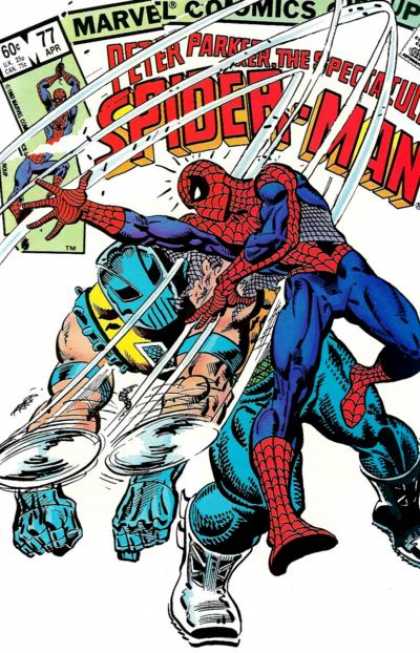 superhero: Oh, yeah those were great years. Those were some great years for comics. I absolutely went nuts over the X-Men as well back then. So did you continue reading as an adult or did you take a break? Like some comic fans take a break from comics and then re-discover them?
superhero: Oh, yeah those were great years. Those were some great years for comics. I absolutely went nuts over the X-Men as well back then. So did you continue reading as an adult or did you take a break? Like some comic fans take a break from comics and then re-discover them?ME: Never. I've never stopped reading comics.
superhero: Wow.
ME: But I have changed...I love comics. They're an amazing form of entertainment. So even though I've kind of strayed from superhero comics now I will never stop reading comics. I always pick up indie comics now like LOVE AND ROCKETS, OPTIC NERVE and manga, I'm getting into manga now in quite a way but I will never stop reading comics. I've stopped reading American comic in a way because I just think they're not...they don't engage me as much now. I think if you buy an American comic it takes you about three minutes to read it and you have no idea what's just happened because you can't remember what happened in the last issue and there's never really a decent cliffhanger. It's such a shame. If they start to write them properly again then maybe I'll go back. I just don't...they're kind of geared more towards being collected, aren't they, into trade paperbacks now?
superhero: Yeah.
ME: I don't know why they're doing that. It's a shame. They're killing themselves.
superhero: Yeah, it does seem like that. It seems like the business model has gone toward collecting them in trades or something like that. But I'm hoping that digital distribution will somehow maybe pull that back.
ME: I don't get it, I really don't get it. Why can't you provide a satisfying read in one issue? It's beyond me.
superhero: Yeah, yeah, it doesn't make any sense but this is the reason why I really like your comic. Because it sort of took me back to the original days of Marvel and maybe sort of a phase that DC went through in the late '80's/early '90's.
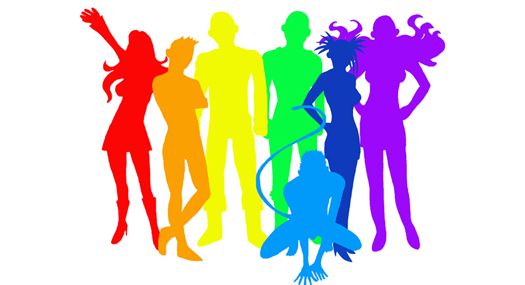 ME: Well, thanks...
ME: Well, thanks...superhero: Which was very straight forward storytelling, a very direct story and it was just a lot of fun. I mean, obviously we haven't mentioned it yet, but we're here talking about SPANDEX, the first collected book, FAST AND HARD, which is what I've read from Titan Books. Like I said in my review, as soon as I picked it up I just loved it from beginning to end. I just couldn't get enough of it. I guess I want to talk more about that later because I want more about your history. So, what is the O-MEN? Because that's where this all started, correct?
ME: Yeah, kind of, yeah. I've always made my own comics right when I was four or five and I think I debuted properly in my junior school when I was about eighth or ninth. I just had got into Star Wars and I created a complete rip-off comic called STAR LORDS.(Laughter)And I wrote and drew it, y'know, pencil and crayons to color it and it's like everyone loved it. All my mates were so excited. And so that was the start of it, really. I've always created comics growing up. There's a comic called the SPACE SCOUT and there's one called THE WONDER MEN (Laughter). And then my mom read them all, she was great. Then I got to the age of about 21 and then I thought, "Why am I only showing these to my mom and to a group of friends? I should be showing them to more people.” I was reading this really good UK comics review magazine called Comics National and they had a massive small press, independent comic section in the back where they reviewed comics and they had a classified section where someone would say, "I need an artist! I need an artist to help me out!" So I kind of realized there was more going on out there and I thought let's see what happens. So I started to dabble in the small press, independent scene in the UK and I drew some stuff for people and then I thought, "Well, I've always had my own stories. Let's take what I've done so far and try and make it into a really good comic." So I just decided to go with the series called the O-MEN. I'd actually done it already at University as a six-part, six-issue comic. And I thought let's take that comic and let's make it really epic. I was reading SANDMAN at the time and a lot of Grant Morrison as well. It really kind of taught me how to, like, get into the characters and kind of make things into story arcs and kind of break things up and explore different themes. So I was really experimenting. So I launched O-MEN I think back when I was 24, fourteen years ago, and I was really learning, just completely winging it. And it got a really good response.
superhero: Oh, great!
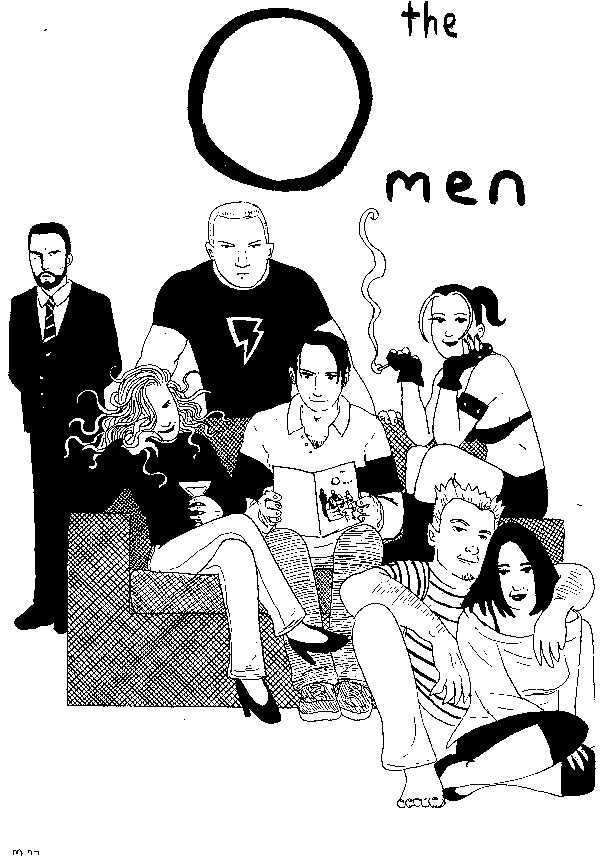 ME: Yeah, yeah, I was trying to get an issue out once every two or three months and I did my first convention I think it was on about issue six or so and the people that came to see me in the first hour of that convention...I had so many people.
ME: Yeah, yeah, I was trying to get an issue out once every two or three months and I did my first convention I think it was on about issue six or so and the people that came to see me in the first hour of that convention...I had so many people.superhero: Really?
ME: Yeah! It was all word of mouth and curiosity and I've never had that much interest since, really. (Laughter)
superhero: From the O-MEN you mean?
ME: Yeah, it's just very memorable for me that very first convention in the UK. So many people came over.
superhero: When was that first convention?
ME: About...ten years ago. I mean for me, I'm quite a quite person and conventions for me aren't really in my comfort zone but I think you kind of just enjoy being there because you enjoy chatting to people about comics all day,and about your comics as well. They ask you questions and you go, "Yeah, yeah this is what happens..." Yeah, so the O-MEN was like a super hero soap opera. Kind of like the X-MEN but almost like a TV soap opera. And it's got horror in it and comedy and drama and it lasted for 35 issues, over ten years, and really got a good response. I mean, one of the later issues got ten out of ten in a review section. I still have people come up to me and say they really miss it. It upsets me a bit, I really like that, but I think, "Well, I'm doing SPANDEX now..."
superhero: Oh, really, so you've got a fan base that is a little bit upset that you've moved onto something else?
ME: They're a little bit upset, but I'm kind of bringing the O-MEN back. I'm collecting all the old issues.
superhero: Oh, great!
ME: Yeah, yeah, I'll send you one! Because basically, part of the thing with the O-MEN was it went for 35 issues and it was really hard to keep it all in print and every time someone would order an issue, I'd be like, "Oh, gosh, where are they? Where have I put them? Do I need to re-print them? How much are they going to cost me?" It might sound really ungrateful but it gets a bit hard to control sometimes. I still have that with SPANDEX now. Oh, gosh, where have I put all those issues...I can't find them!
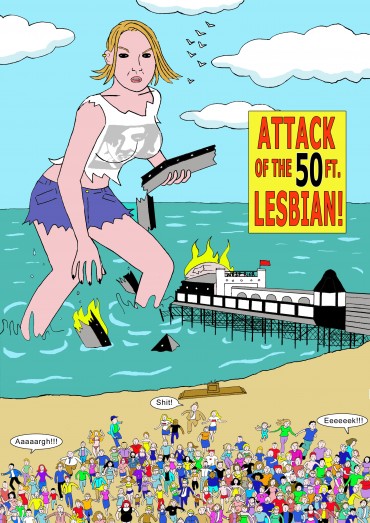 superhero: That's interesting because usually an independent creator’s biggest problem are the finances of getting it out but you seem to be talking about the storage aspects of it like, "Where do I keep them all?"
superhero: That's interesting because usually an independent creator’s biggest problem are the finances of getting it out but you seem to be talking about the storage aspects of it like, "Where do I keep them all?"ME: I mean it's all over the place. I mean I work full time and most of my issues are at work.
superhero: Gotcha.
ME: I've only got a small flat in London so I haven't got room to keep all my comics here.
superhero: That's hysterical. And your work has no problem with that?
ME: They don't, no. (Laughter)
superhero: So it's interesting to me...you said 35, 34 issues?
ME: It was 35 issues, yeah.
superhero: Over the span of, like, ten years so I guess...how many issues would that have been a year? What was your publishing schedule like?
ME: I was really trying to go for once every two or three months. Because I was noting that there were a lot of people doing similar things to me and they would often take long breaks, maybe over a year, not just small press. I mean if you look at independent people, even some of the biggest independent names...they only release stuff once a year, even now, don't they? It's a shame. I really wanted to try and keep it as regular as possible but things towards the end with juggling the day job and O-MEN, I think I burnt myself out. Yeah, I should have taken my time more. I just wanted to get it done. Yeah, that's one of the reasons I did SPANDEX, I needed a break from the O-MEN.
superhero: I find it admirable that you stuck with it because I know that for, people that I know, and myself too, trying to create even a web-comic or a comic you just sort of might give up after a while. Just sort of, just get tired of it. How did you find...did you just love it so much? Or were there times where you just thought," I don't wanna do this anymore." That sort of thing?
ME: There was never a time when I thought I don't want to do this anymore because I was always thinking about the issues ahead, thinking, "Wow, that's gonna happen in two issues time, I can't wait to draw it, I can't wait to write it!" I was never going to give up. But I did burn myself out. There was one issue where I worked so hard to get it done, it was a collaboration issue, there were other people who were helping me. And I just burnt myself out and there was a convention, quite a small convention, but I was going to go to it and launch the comic there and I couldn't even go. I was just so tired.
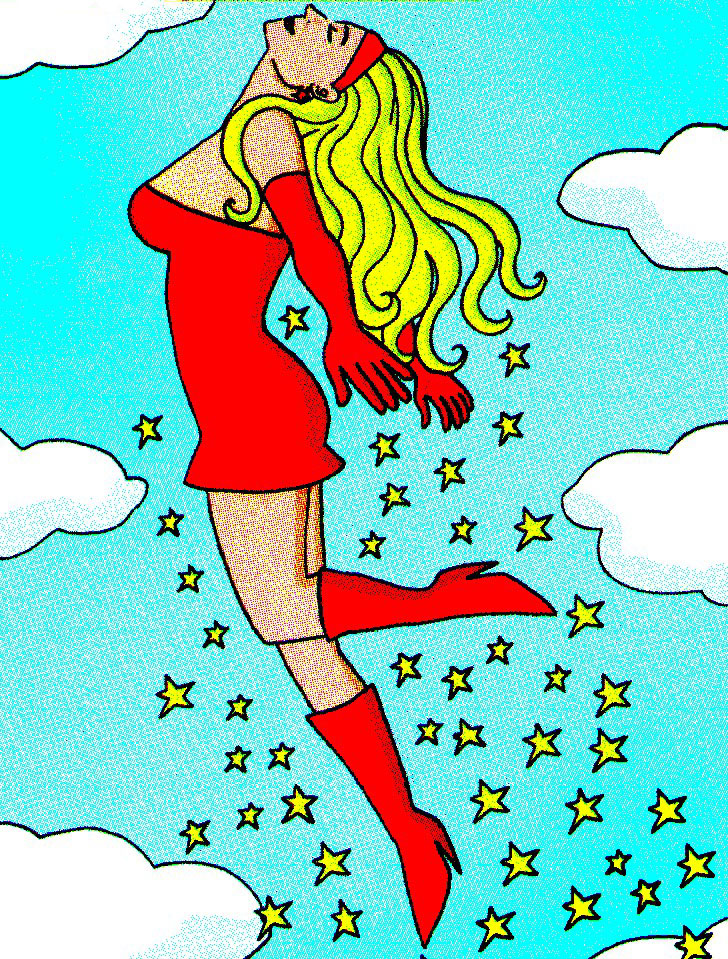 superhero: Oh, wow. (Laughter) So at what point does the O-MEN become SPANDEX because I know that SPANDEX grew out of the O-MEN, at least from what I've seen online and what is in the book...you mention the O-MEN. At what point did the decision happen where you said, "I'm going to end the O-MEN and I'm going to go onto this different thing." When did that occur?
superhero: Oh, wow. (Laughter) So at what point does the O-MEN become SPANDEX because I know that SPANDEX grew out of the O-MEN, at least from what I've seen online and what is in the book...you mention the O-MEN. At what point did the decision happen where you said, "I'm going to end the O-MEN and I'm going to go onto this different thing." When did that occur?ME: The O-MEN hasn't finished. I mean, I finished volume one which went from 28 issues and then I started volume two and I got to issue 7 and that is where I started to burn myself out, I'd really been overdoing it, and I thought, " I want to do something different." Because, also the O-MEN...I was finding at conventions...there are people that are put off...it's hard to get new readers because when you are on issue 35 people don't really want to buy it.
superhero: Really?
ME: I mean that's OK for X-MEN but not really for small press and I was finding it really hard to keep everything in print and take everything to a convention...I haven't got a car so it's pretty back breaking. I just thought, I was getting this inkling, this feeling that I needed to have a break from it. So I just put O-MEN on hiatus to have a break from it. Because also I felt like I'd learned a lot, like I'd improved a lot, and I wanted to do something new to kind of showcase what I'd been doing and put something out there that was a right representation of where I was. I didn't really feel that the O-MEN was because the early O-MEN issues were quite rough and quite raw. Even though people who were reading the new O-MEN books, the new collections, do like them, for me they're really so different to what I'm doing now. I wanted to put everything into this new project. I also wanted to do something different than the O-MEN because the O-MEN is a very, kind of, sprawling epic storyline and I wanted SPANDEX to be a bit more fun, a bit more finite, and a bit more self-contained. I think it all kind of happened quite naturally. O-MEN has got a massive cast of characters and there's a lot of people in the background. I was just starting to notice people that I hadn't developed at all. And I thought, "I think that's a lesbian and he's gay." And I started to think, “What if they all got together? What if they got into a group?" And then I thought, "Has that been done before?"And I didn't think it had and apparently it has in some indie comic but I didn't know. And I thought, "This is a really good idea!" It's quite funny because I was going to launch SPANDEX and I was also offered to draw another series for a UK based comic and I was going to do both and it got to the stage where I was like, "I can't do both. It's impossible. I really want to do both." I kind of dumped the other project and I'm quite glad I did because SPANDEX took off better than I thought it would.
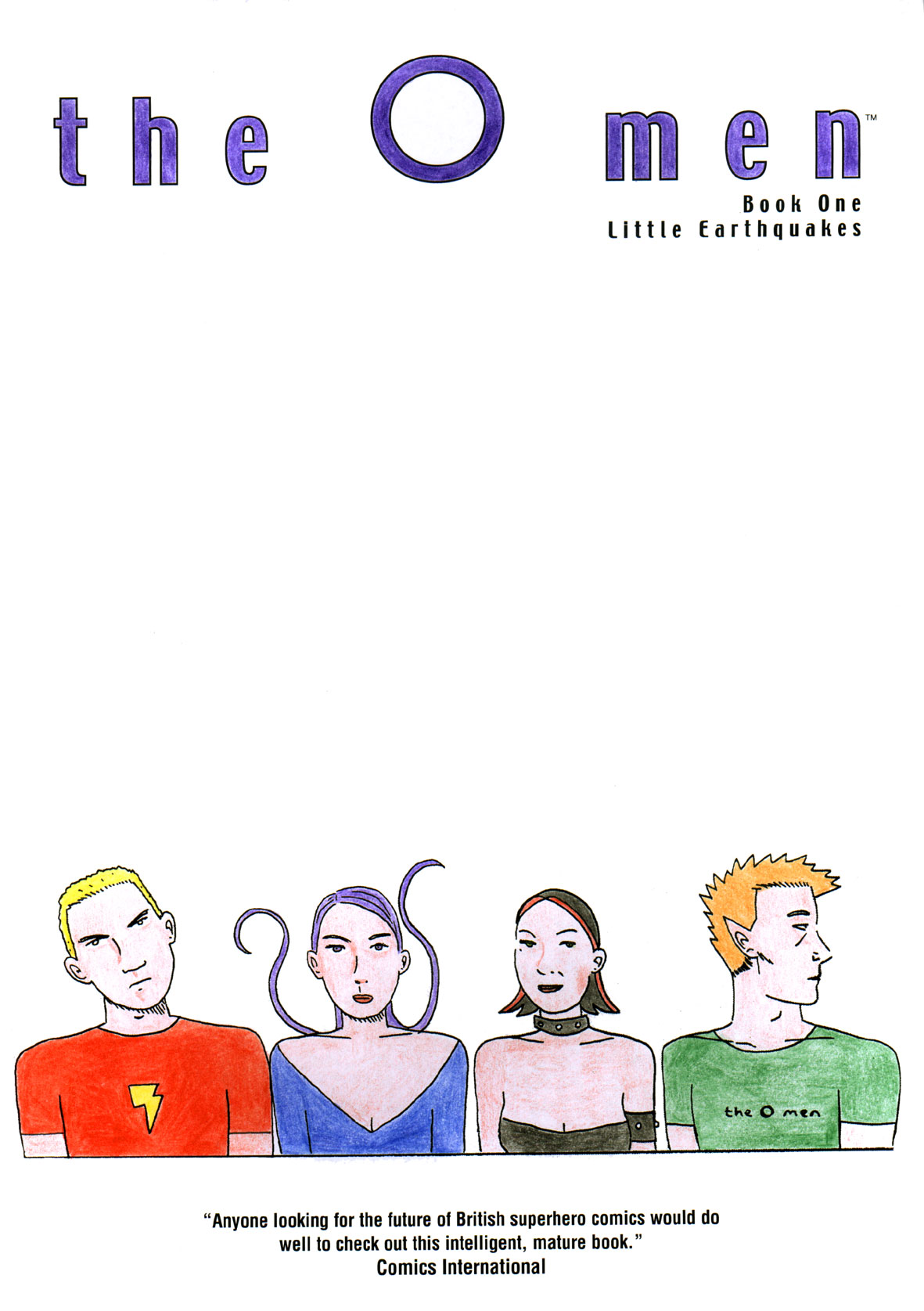 superhero: So the O-MEN was not an all gay book?
superhero: So the O-MEN was not an all gay book?ME: No, not at all. There are some gay and lesbian characters but that wasn't really the whole point of it. No, it was just...the O-MEN...I think my comics kind of write themselves and the O-MEN were what they were. There weren't really any lesbian or gay characters in the main team but there were some in the supporting characters.
superhero: So why the decision to do an all gay superhero team? Was that just the hook? Or are you gay? Or is it just a personal preference? What made you say, "Let's just make them all gay?" You know what I'm saying?
ME: Yeah, I am gay. I just thought it was an original idea and I had a story as well and I thought, "OK, who's going to read another superhero book? What's the spin?" You have to have a spin these days I think. You have to kind of have to have a reason for it to be there and I think that was a very good reason for it to be there. I think there's so much to cram into every issue of SPANDEX I kind of do wish there were more straight characters in it. There aren't that many and it's a shame. There are a lot of story elements that I haven't had a chance to address just purely because of space reasons. I wish there were some more straight characters in it but unfortunately that's just the way it turned out.
superhero: Yeah, I mean, I think it's great. I think it's a great thing because in my opinion there aren't enough gay or alternative lifestyles or whatever you wanna call them, in mainstream comic books. I mean, the X-Men has always had the mutants but that's always sort of been the stand in for everything without addressing the actual issues, right?
ME: Yeah, it's a massive kind of metaphor isn't it? It's just such a funny situation because if you look at Mystique and Destiny in X-Men they were apparently a lesbian couple.
superhero: Oh.
ME: Yeah, Chris Claremont always said afterwards that they were actually in a relationship. If you look back it's like, "Oh yeah, they are!" because they became foster parents to Rogue. It was all very unspoken. But a nice relationship. It's a shame that Mystique, as far as I know...I haven't really seen much of her recently, but I think she's completely straight now so...
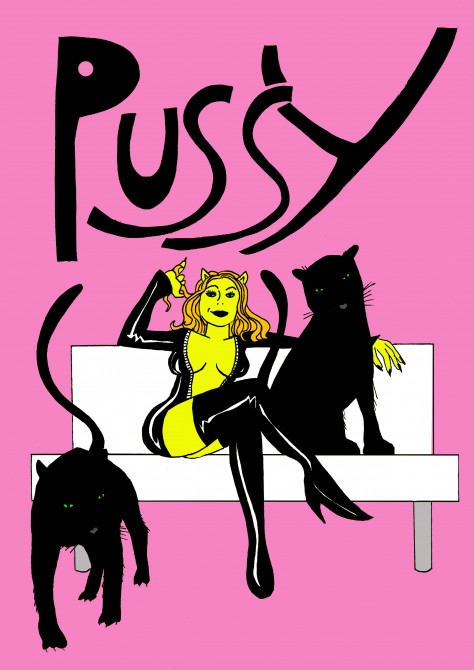 superhero: Yeah, I think they might've done something like that. I'm not sure. They're always...Marvel and DC characters are always changing, you can never pin them down or what they're going through. So you started SPANDEX and you did a first issue and, according to what you wrote in this collected edition, you went to a convention and it just picked up? Like, right away?
superhero: Yeah, I think they might've done something like that. I'm not sure. They're always...Marvel and DC characters are always changing, you can never pin them down or what they're going through. So you started SPANDEX and you did a first issue and, according to what you wrote in this collected edition, you went to a convention and it just picked up? Like, right away?ME: Kind of, yeah. I mean I'd been working on the first issue for a year and I finally got it done. I mean the idea was that, I was going to do like seven issues in a year and pitch it to a publisher because I didn't wanna pay for it myself. Because I knew that it was a color comic and I didn't want to pay for that. It all went a bit wrong because the first issue took me a year and ever issue after that took me at least six months so that was looking a bit unlikely. I finished the first issue and I was quite happy with it so I just printed up 200 copies, mainly to show to friends. There was a convention coming up, quite a small one, in London and so I took it along for that and the response was really interesting. I was quite nervous about it but, I guess the colors, people were just drawn to it. I put some flyers by the door and they went, like, in an instant. Yeah, it was incredible, really. It was a really encouraging situation. It's really nice, that's one of the good things about starting out as a small press or independent person...just seeing the reaction to it, good or bad. Yeah, it was interesting to me.
superhero: Yeah, I mean, I think it's a...I mean, whatever you wanna call it with the hook of the all-gay superhero team...I mean, I personally am straight and I, uh, y'know...when I first got it...like what I said in my review...I was a little bit like...the knee jerk straight guy reaction kind of kicked in. I was like I don't know about this. Is this going to speak to me? But I have to say as far as, like, superhero tales go...it's great. It reminds me very much of...have you ever read JACK STAFF?
ME: Yeah, Paul Grist.
superhero: Yeah, I mean, it reminds me very much of that and JACK STAFF was one of my favorite comics of the past decade and this is, I mean it's obviously a different tone and everything, but it reminds me very much of that. I love the book. I can't tell you how much...it's just a very straightforward superhero story and it's a lot of fun. How did you go about developing the characters? Were they all developed through the O-MEN? Did you introduce new characters in this series?
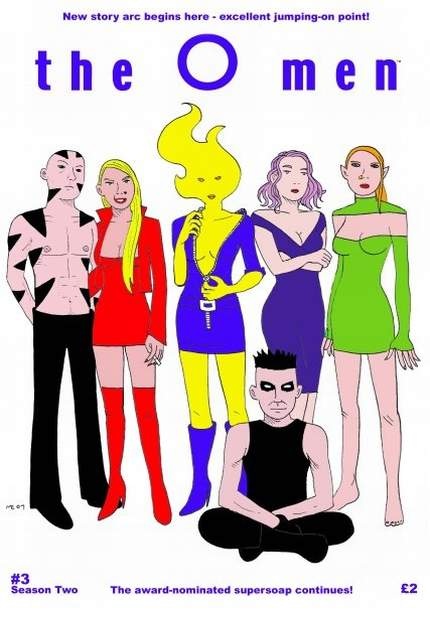 ME: Actually, can I just go back and say thank you for saying that about you being a straight reader and really liking it because that's really important. And I'm finding that I have got a lot of straight readers. That's what I wanted because I was really worried that straight people would be put off. Yeah, I did a convention when I was launching issue two which got a very pink cover. That convention had a very kind of straight-like fanboy crowd and I was noticing that it was really hard to get people to come across to a pink comic (Laughter). So it was a bit of a struggle. A lot of my readers from the O-MEN have come over to SPANDEX and I've got a lot of quite savvy, young, straight people out there who don't care about gay issues. It's not a problem to them at all. I’m finding actually that, with Titan Books, they actually just put out a press release for the SPANDEX book, and I'm finding that some lesbian and gay newspapers and magazines...they're a bit kind of wary of it. They think I'm taking the piss...
ME: Actually, can I just go back and say thank you for saying that about you being a straight reader and really liking it because that's really important. And I'm finding that I have got a lot of straight readers. That's what I wanted because I was really worried that straight people would be put off. Yeah, I did a convention when I was launching issue two which got a very pink cover. That convention had a very kind of straight-like fanboy crowd and I was noticing that it was really hard to get people to come across to a pink comic (Laughter). So it was a bit of a struggle. A lot of my readers from the O-MEN have come over to SPANDEX and I've got a lot of quite savvy, young, straight people out there who don't care about gay issues. It's not a problem to them at all. I’m finding actually that, with Titan Books, they actually just put out a press release for the SPANDEX book, and I'm finding that some lesbian and gay newspapers and magazines...they're a bit kind of wary of it. They think I'm taking the piss...superhero: Really?
ME: I'm trying to say to them, "No, no...I'm not taking the piss!" Y'know, I'm just having a bit of fun and it's just a tongue in cheek adventure. I think hopefully it will turn them around. I do think I've got some mountains to climb, in a way.
superhero: Really? That's interesting. That the gay community might think that you were teasing them a bit because I don't see that at all. I mean, it's a different tone than say, like, something that's ultra-mainstream and gritty. Which is what a lot of comics have become today and I think maybe the thing is that people aren't used to seeing something just fun. Y'know?
ME: I think people need fun these days. I think that what happened with SPANDEX was that a newspaper picked up on it two or three years ago when I launched the first issue originally and there was big picture of the team on the front page of the newspaper and that was when it all pretty much started for me on SPANDEX. It was really good to hear the reactions of my friends. "Oh, I laughed so much when I saw it!" And everyone likes it but there're some people that ...it's hard. I guess I aimed the comic at people on my wavelength in whatever way… whether they're comic fans, whether it's a sense of humor thing. There are some people who are not on my wavelength and they get offended and they were saying about the team...in the newspaper they were saying about the theme, "Oh, it was so cliché. So patronizing"
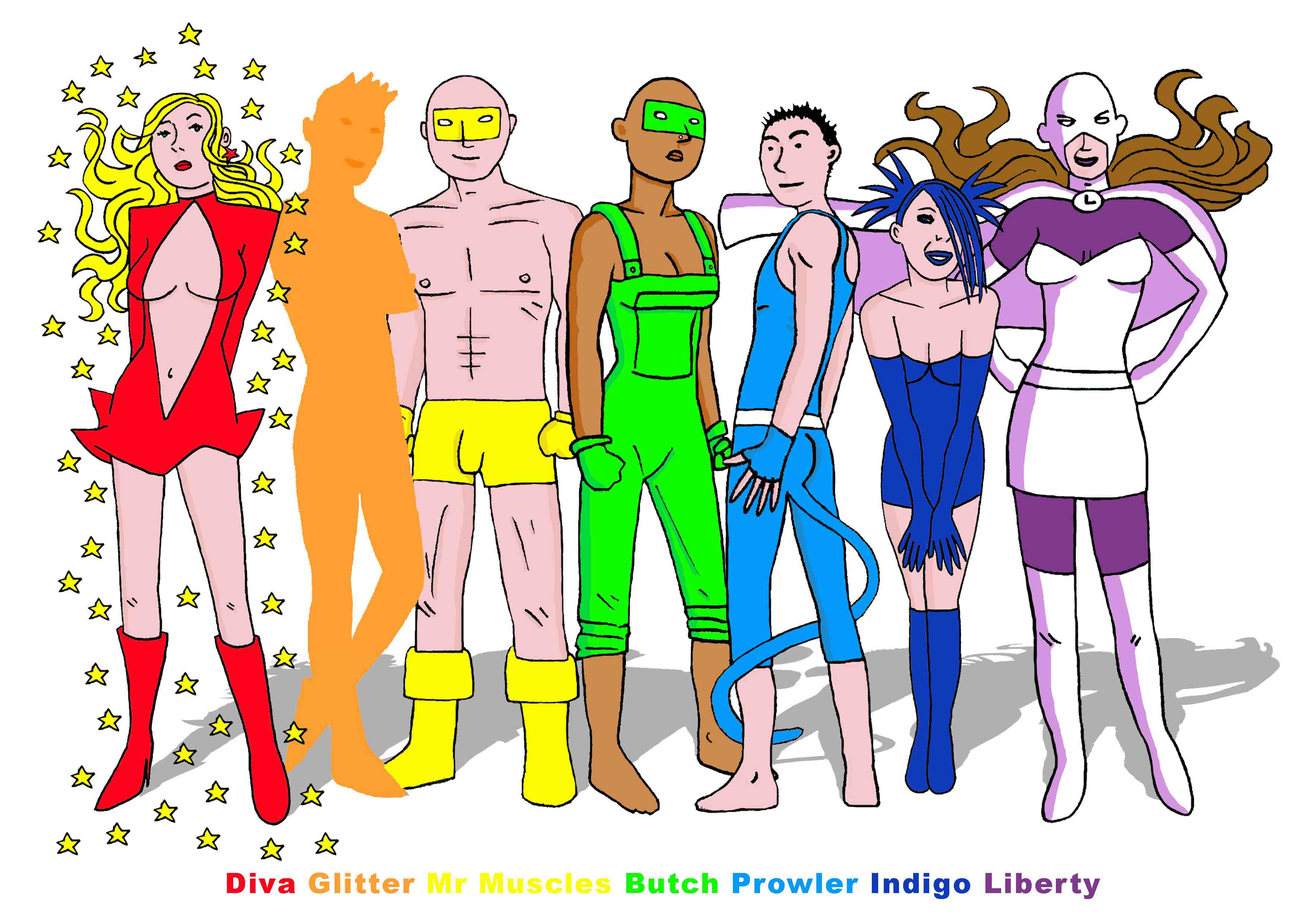 superhero: Really?
superhero: Really?ME: Yeah, it's annoying. There's a guy on YouTube who did a review of it and he didn't even read the comic. He did a review of the team from the newspaper, in the article.
superhero: You're kidding!
ME: Yeah, yeah, he was really laying into it and saying he hated it and then there was about 10,000 comments saying, "This article's just terrible. It's rubbish!" Stuff like that. It's at that point that I stopped reading comments on any internet site.
superhero: Probably a good idea! Just in general...
ME: It's not worth it. I don't do it anymore.
superhero: Yeah, I just think it's a lot of fun (Meaning SPANDEX, not trolling internet message boards) When you were setting out to do it did you just set out to do a fun superhero story? Like why not go the way everyone else is going? I know you said everyone sort of needs a little bit of fun...but I know it seems like a lot of indie superhero books want to be , you know, the next Grant Morrison or the next Alan Moore. Why go the way you go? It seems like the less popular route these days, to just have a fun adventure book.
ME: I think maybe being different is a good thing because if you look at what a lot of the main comics are at the moment...it's so complicated and so much baggage and so dark and just...uhhhhh. I just wanted to put something out there that was fresh and...it's not all fun, though. The first three issues in the book, they're kind of setting it all up and you get to know the team pretty much inside-out. But I did want SPANDEX to be more fun and more self contained. I think...I couldn't help myself. The next few issues start to get more involved and things get revealed and shocks start to happen. It's still fun! There's kind of a balance between fun and horror and drama. It's gonna get more involved really as it goes on.
superhero: I love the characters. I mean, Diva, Glitter, Mr. Muscles, Butch, Prowler, Indigo, Liberty...I mean you've even got a character here called "Pussy" which is hysterical. Which one is your favorite?
ME: I think Prowler because he's got an amazing power. He's got the power to absorb the skills and abilities of any gay person. (Laughter) It sounds quite familiar, doesn't it?
superhero: That's great!
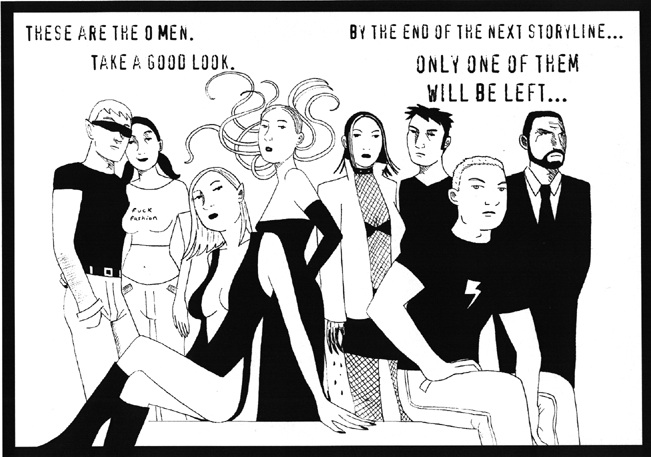 ME: That's something that I got slated for at the start as well. People were saying, "What are you talking about? What sort of powers do gay people have?" Oh, for goodness sakes! He can absorb a language. You know, they go to Japan in issue two and he absorbs the Japanese language. You know, he can absorb how to cook, he can learn a new skill. It's interesting. It's a good power. I like exploring it.
ME: That's something that I got slated for at the start as well. People were saying, "What are you talking about? What sort of powers do gay people have?" Oh, for goodness sakes! He can absorb a language. You know, they go to Japan in issue two and he absorbs the Japanese language. You know, he can absorb how to cook, he can learn a new skill. It's interesting. It's a good power. I like exploring it.superhero: Yeah… obviously, I liked Diva a lot. I don't know why (laughter).
ME: I wanted someone beautiful; I wanted someone who was really pretty and just really powerful. I have called her my lesbian Wonder Woman but I think she's prettier than Wonder Woman.
superhero: I also like Indigo, too. Indigo was great because she doesn't really speak much during the whole series, she's kind of mysterious.
ME: Indigo, she was pretty much the last one I created. I found her really hard to get right. She was pretty much the last one that came into my head. At first she was just a teleporter but then I came up with the idea to give her the 'Indigo Room'. She can teleport into it and get any weapon she needs or any costume. There has to be a unique spin to a character these days. You can't just do a superhero that can fly. You have to give them a really good reason to exist. My characters have got interesting spins.
superhero: Yeah, they all do. I think as you go through the book little things get revealed here and there and you're just kind of like, "Oh! That's interesting! Oh! That's really neat!" How many issues are you at? This is the first three collected, correct?
ME: Yeah, Titan collected the first three. So, at the moment I'm on issue seven. Right before you phoned I was right in the middle of issue seven. Issues four to seven are a four part storyline, it's called OMFG.(Laughter) It's pretty big. You know Lez Girls, the lesbian villains who've been hanging around in the backround? They launch their attack on the team and it's not pretty.
superhero: Oh, really?
ME: A lot of my readers were really upset with me when I released issue four.
superhero: Really?! Oh, wow!
ME: They were quite cross.
superhero: So is Titan Books going to collect that as well?
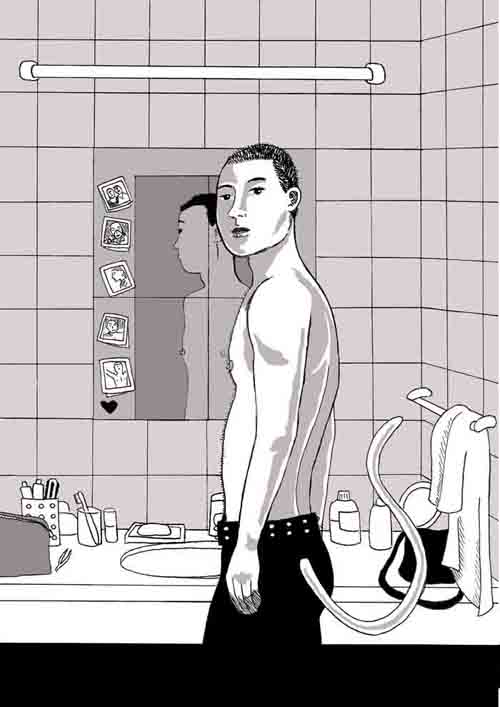 ME: I don't know. I haven't spoken to them yet. I really, really would like them to. I do think, for me, it's interesting seeing the reviews of the book because I really was still learning. I was just learning all from scratch. As any writer/artist does they look back on their first few issues and they're like, " Oh, gosh. That bit wasn't good and that bit wasn't good. I think with issues four onward I've really started to find my feet. I'd really like them to do another book.
ME: I don't know. I haven't spoken to them yet. I really, really would like them to. I do think, for me, it's interesting seeing the reviews of the book because I really was still learning. I was just learning all from scratch. As any writer/artist does they look back on their first few issues and they're like, " Oh, gosh. That bit wasn't good and that bit wasn't good. I think with issues four onward I've really started to find my feet. I'd really like them to do another book.superhero: How did you come into contact with Titan Books?
ME: It’s really funny story... I actually work...it seems really bad...I actually work for Titan Magazine...
superhero: Oh really?
ME: Yeah, but it wasn't like a...I know it sounds really dodgy. Like I just paid them ten pounds or something. It's quite a separate part of the company. We all work separately. I don't really know anyone down there that well. I had pitched it around to quite a few publishers and some of them said to me, "We don't do superheroes." Some of them said,”We can't do gay comics." And I thought Titan...they just do a diverse array of comics. So I thought, "Why not?" So I had to pitch it just like anyone else would. I had to do anything that anyone else would have to do and it was great. I mean it was really smooth process.
superhero: I guess the last thing I wanted to touch on is...I really liked the art in this book. I mean at first glance I thought, "Oh, maybe it's a little simplistic or it's not really that sophisticated." But I think your storytelling is dead on. I mean I love it. When I saw the cover I was a bit wary but as I got into it...I just think you do a really good job. Are you self taught or did you train anywhere?
ME: Yeah, I've had no training at all. I've just been drawing since I was three or four. I just always loved illustrated stories and I've always, y'know, got inspired by them and just copied them. But, yeah, it's interesting about the artwork because I think that the writing...I've got no concept of what my art or my writing is...because I'm so close to it. If I put an issue out I don't know if it's good or if it's bad...all I can do is my best and I have to wait for the reaction. I'm confident in my writing because I get a lot of good things said about that. The drawing, yeah, I've heard a lot of mixed reviews about the drawing and I think that the main point is people say that it starts off and people say, "What is this?" And then they say, "It's very simple." And then they go, "But it really suits it. It really works. It's really interesting." No one's said, "The art is rubbish." Which is nice. Someone said it was like the guy who does POWERS. So it's interesting. It's funny though because when I sketch, when I'm just sketching when I'm at work or when I'm doodling in a meeting, the drawing is actually quite detailed. It's actually quite, um, textured and...I don't know what it is...when I come to draw SPANDEX it just all gets taken away. It is what it is. It's just how I do it. I don't know how to do it any other way really. O-MEN was a bit different. O-MEN was black and white and it had a lot more scratchy lines, a lot more detail to it. You'll see it when I send you a book.
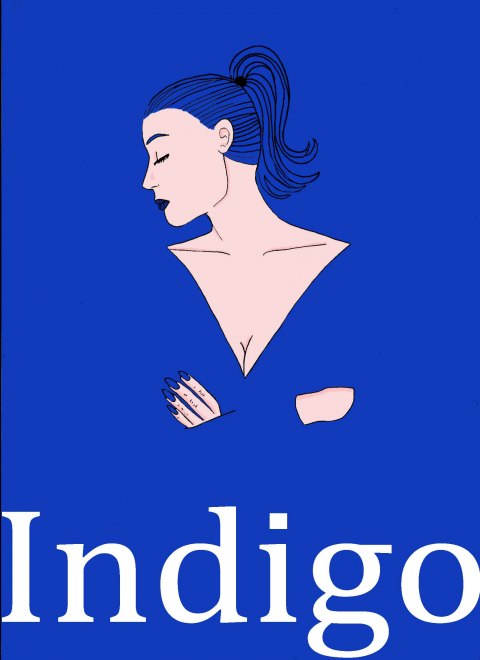 superhero: But I really like the fact that it's very sort of without the cross-hatching and things like that. It almost reminds me sort of an animated story. I think it's really good. I think in the collected book you mentioned something about learning Photoshop as you were starting? You colored it yourself as well, correct?
superhero: But I really like the fact that it's very sort of without the cross-hatching and things like that. It almost reminds me sort of an animated story. I think it's really good. I think in the collected book you mentioned something about learning Photoshop as you were starting? You colored it yourself as well, correct? ME: Yeah, when I was developing SPANDEX I thought, "It's got to be color." because color is so important to the whole story and the whole theme. I was really horrified because I was like, "How can I afford this?" It didn't turn out to be too bad. But yeah, I had to color it myself. I've got really good friends, one of my best friends, and he's helped me since day one back on the O-MEN. Because I've always hand drawn everything but you have to design everything, you have to do covers, you have to do logos. I just sat down with him for SPANDEX and said, "Look, I haven't got a clue about Photoshop. Can you help me?" It was really difficult because I'm not really a technologically minded person and, I don't know how much you know about Photoshop, but to me...the idea of layers took a very, very long time to...
superhero: Oh, really?
ME: Yeah, I could not get my head around it. My friend was getting really frustrated with me. He knew I wasn't listening to him in the tutorials. I would just zone out. I was like, "I do NOT understand this." But I just winged it. I'm getting better. I'm still learning. I mean, the first three issues I worked on I had a really rubbish version of Photoshop and it corrupted and a lot of the artwork kept on getting damaged. A lot of the early issues, sadly, I haven't got them layered because they were all messed up.
superhero: Oh, wow.
ME: Yeah, it's only now, only really now with issue seven that I'm confident that I'm actually layering it all properly and putting the artwork all properly as it should be. Yeah, there's no point in me sending the Photoshop files to any publisher because it's a mess. (Laughter)
superhero: So did you design the logo as well?
ME: Interesting story there. Do you know John Workman?
superhero: Yeah! I mean I've heard of him. I don't know him.
ME: He's a letterer on a lot of stuff. He does a lot of stuff for Walt Simonson and he letters a lot of stuff for Tommy Lee Edwards. Well, part of my day job is I edit comics.
superhero: Oh, wow!
ME: Yeah, I was editing the TORCHWOOD comics.
superhero: Oh, wow!
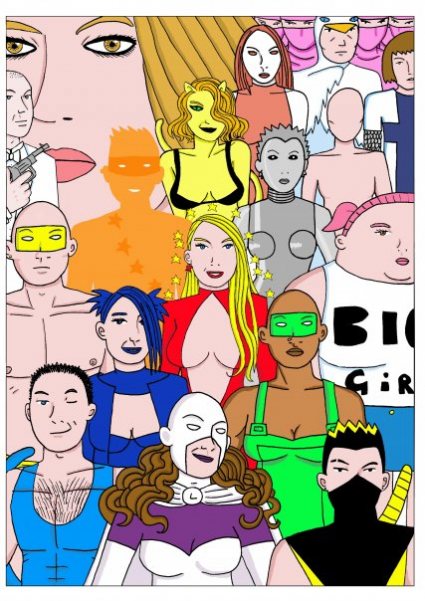 ME: Yeah, and I was working with...I got to know John Workman because he did a story...I don't know how much you know TORCHWOOD?
ME: Yeah, and I was working with...I got to know John Workman because he did a story...I don't know how much you know TORCHWOOD?superhero: Oh, I love TORCHWOOD! DOCTOR WHO, TORCHWOOD, I'm a fanatic!
ME: I'll send you a big package, don't worry! (Laughter) When I took over on the TORCHWOOD comic at work, I did, John Barrowman wrote a story for us...
superhero: Yeah, yeah, I interviewed his sister! Didn't she write a comic for...
ME: Yeah, Carol wrote it as well and Tommy Lee Edwards did the artwork. Of course John Workman did the lettering. I got to know John really well. We just became e-mail buddies and we just chatted about all sorts of stuff…all about old comics and stuff. And I was showing him some SPANDEX stuff and he just came out and said, "Oh, I'll do the logo for you!"
superhero: That's great!
ME: It's not the one on the book, actually. It does appear in the book. But the one on the cover is done by Titan. The one inside...I do use it sometimes on my covers...it's by John. It was really nice of him to do that for me.
superhero: Oh, that's so great! That's terrific! Well, I gotta say, I love the book...where do you go from here? Are you just going to keep doing SPANDEX or...?
ME: No.
superhero: No? It's finite?
ME: It's basically...the issue I'm working on now...number seven...is the final part of the four part story that I've been doing and it's kind of almost...it's not quite the last issue of the series but it kind of is. Seven is the final part of that storyline. There will be one more issue that I'll do next year. There will be a SPANDEX special and it wraps everything up and I can't say much about it. Spoilers, y'know. I don't want to carry on doing it forever. I don't think the novelty will wear off but I don't want people to get bored of it. I am a bit worried actually at the moment because of all this, the whole gay thing. The whole gay marriage and I just think, "Oh my god, people are going to get sick of this." (Laughter)
superhero: Well, what do you think about that stuff?
ME: Um, I think Alan Scott...boring.
superhero: Yeah, yeah.
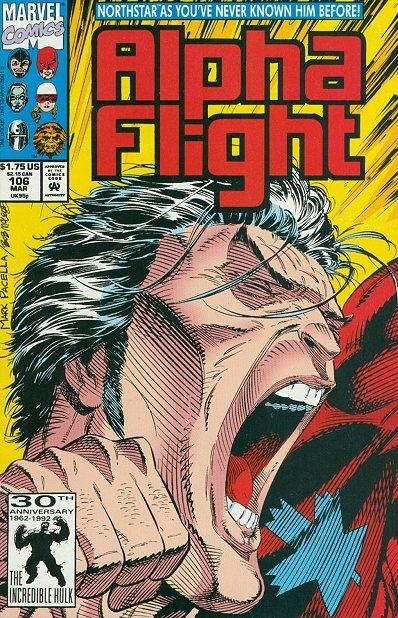 ME: He's not a major character and I never really liked him anyway. I never understood the JSA. I don't know why they're still alive. Why are there all these old superheroes still going on about? (Laughter) Northstar and Kyle...I don't know...it's not very interesting. I think Northstar, maybe if he was marrying a fellow superhero then that'd be fantastic. I'm hoping that him and Kyle will be the first gay divorce so he can marry someone more interesting. But I'll still buy the wedding issue and see how they get on.
ME: He's not a major character and I never really liked him anyway. I never understood the JSA. I don't know why they're still alive. Why are there all these old superheroes still going on about? (Laughter) Northstar and Kyle...I don't know...it's not very interesting. I think Northstar, maybe if he was marrying a fellow superhero then that'd be fantastic. I'm hoping that him and Kyle will be the first gay divorce so he can marry someone more interesting. But I'll still buy the wedding issue and see how they get on.superhero: Sure, sure, I think it's going to be really popular. Which I think to a certain extent it's good that they're sort of doing it. I think that there's maybe sort of an altruistic bent because it's so crazy over here in the US with those issues. But I think the whole Alan Scott thing was a big...I'd have been happy if they'd made Superman gay. That would have been really bold. (Laughter)
ME: I really thought it was going to be Wonder Woman actually.
superhero: Really?
ME: Yeah.
superhero: Oh, wow...that would've been interesting. Well, this is great and thank you for doing this. I really appreciate it, I love your book. I can't recommend it enough. Like I said, I didn't know what to expect when I picked it up but I did not put it down as soon as I did pick it up. Honestly. I found myself with some spare time and I picked it up and I did not put it down. I read it the whole way through on the first read so...
ME: I'm really glad you said that. If there is a book two I think it will knock your socks off. I think things happen and it's really intense. I think you know the characters now so when things start to happen it gets a bit more heavy. But don't worry, I do love my characters so, you know, they'll be OK.
superhero: So, how can people get the next couple of issues? Do we just wait for the Titan book or...because you're in the UK. Can you order them through your site?
 ME: It's up to everyone what they want to do, really. I mean I've got all the firsts, I've got the next three issues after the book all here and if people want to buy a PDF they can. I've just got an ipad. I love reading comics off of my ipad. Y'know, it's a good way to read it. I'm happy to post things to America. I just have to work out the postage costs which can be quite expensive. But, no, hopefully if there is another book it should be out by next year. Because I'm getting issue seven out in November so that all will be ready to be collected if they want to do that.
ME: It's up to everyone what they want to do, really. I mean I've got all the firsts, I've got the next three issues after the book all here and if people want to buy a PDF they can. I've just got an ipad. I love reading comics off of my ipad. Y'know, it's a good way to read it. I'm happy to post things to America. I just have to work out the postage costs which can be quite expensive. But, no, hopefully if there is another book it should be out by next year. Because I'm getting issue seven out in November so that all will be ready to be collected if they want to do that.superhero: And that's spandex.com?
ME: Yeah, they've got a website. It's www.spandexcomic.com and I'm on Facebook as well, just Spandex Comic.
superhero: That's awesome. Again thanks for doing this and best of luck in the future and I look forward to either the next collection or I'll probably pick up the next couple of issues as soon as I can. I really enjoyed it and I appreciate what you're doing.
ME: Thank you very much that's really kind of you.
superhero: So that’s it! Be sure to check out the collected SPANDEX edition by Titan Books and to check out the sites for Eden’s self-published O-MEN as well! Special thanks to Tom Green at Titan Books for getting me in touch with Martin Eden. Don’t forget to check out my own podcast at www.parttimefanboy.com for the complete audio interview with Martin Eden!
Discovered as a babe in an abandoned comic book storage box and bitten by a radioactive comic fan when he was a teenager, superhero is actually not-so mild mannered sometime designer & cartoonist, Kristian Horn of Los Angeles, California. Some of his work can be seen at www.kristianhorn.com and check out his blog at www.parttimefanboy.com. You can check also out his webcomics at www.babybadass.com and thediplomatics.com, which is currently in development.
Proofs, co-edits & common sense provided by Sleazy G
